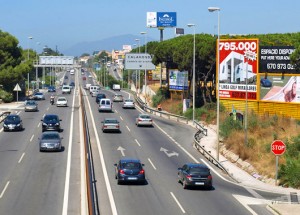
The latest study shows the road is clear for Spain, but economic improvement may bring further tailbacks
One upshot of Spain’s recent economic woe has been a dramatic cut in the time the average motorist wastes waiting in traffic jams, according to data revealed this week by Catalonia’s Royal Automobile Club (RACC).
Since 2010, the time that drivers in Spain spend waiting in traffic jams has fallen by 63% on average across the country, with Barcelona’s motorists enjoying a fall of 76%, which equates to just 15 hours per year waiting in traffic…
Although the study did not explore the exact reasons for this contraction in waiting times, experts believe it to be inextricably linked to the recent recession in the country. High jobless figures mean that there are fewer commuters on Spanish roads, particularly around peak travelling times in the morning and late afternoon.
At the height of the country’s last economic boom pre-2008, Spanish roads could become notoriously congested, even in regions such as the Costa del Sol: an area blessed with a number of ostensibly high-speed toll road alternatives designed to ease congestion in and around the popular resorts.
The most congested city in Spain remains Bilbao, however, where drivers still spend an average of 24 hours per year idly tapping their steering wheel (or irately honking their horn) as they wait for the traffic to disperse.
The RACC study analysed the traffic of 13 EU countries and found that Spain had enjoyed the third-highest fall in waiting times since 2010, behind Portugal (86 per cent) and Hungary (64 per cent).
The report also suggested that waiting times are slowly on the rise again in Spain – which tallies with other reports that suggest the Spanish economy is now, once again, slowly moving in the right direction.
So the next time you are caught in slow-moving traffic while tootling around Spain, try to look on the bright side – at least it means the economy is moving, even if you are not.
 en
en



 Vlaams-Nederlands
Vlaams-Nederlands
0 Comments
Leave a Comment
DISCLAIMER
The opinions and comments expressed by contributors to this Blog are theirs alone and do not necessarily reflect the views of VIVA Homes Under the Sun Ltd, any of its associated companies, or employees; nor is VIVA to be held responsible or accountable for the accuracy of any of the information supplied.
Have you got something to say?